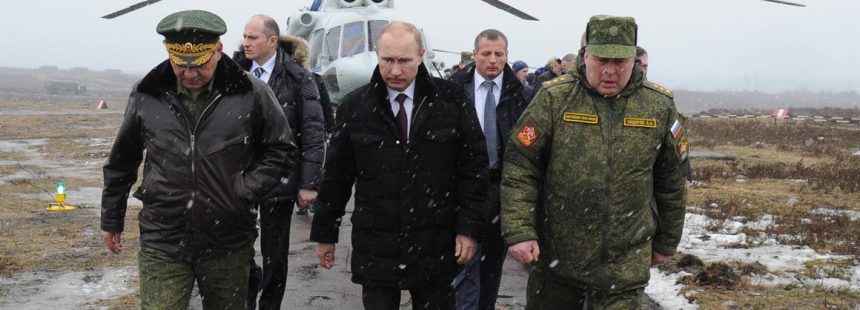

via POLITICO
It’s been a busy few weeks for Vladimir Putin. In the last month, the Russian president has hosted the Olympic Games, invaded a neighboring country and massed troops along its border. Back in Moscow, the Kremlin has cranked up the volume of hysterical anti-Western propaganda to a roar while cracking down on the last vestiges of the free media. All the while, he proclaims he wants peace and accuses Western leaders of hypocrisy and anti-Russian sentiment. If Putin wanted to do a better imitation of Adolf Hitler circa 1936-1938, he would have to grow a little mustache. Equally troubling is that the leaders of Europe and the United States have been doing a similarly good impersonation of the weak-kneed and risk-averse leaders who enabled Hitler’s rise in the 1930s.
I know full well that any mention of the maniacal Nazi leader is viewed as being in poor taste by many. The good news is that it took many years for the West to finally admit that Putin is a dictator and only a few weeks for respected public figures such as Hillary Clinton to acknowledge how closely he is following in Hitler’s footsteps right now. Nobody except the most naked of Kremlin apologists is debating whether Putin’s anything but a tyrant anymore. Instead, we’re searching for the right historical analogy: Is it Budapest 1956? Prague 1968? Austria 1938?
To which I say: Welcome to the club! It remains to be seen, however, if the media figures and politicians who have so quickly adopted my Anschluss rhetoric are willing and able to do what is necessary to stop repeating the past. In recent days, the United States and several European governments have bolstered their statements, which will, I hope, now be followed up with strong sanctions and other steps to ostracize and deter Putin.
Over the past nine years I have dedicated most of my life to opposing Vladimir Putin’s campaign to destroy democracy and civil liberties in Russia. My efforts have included everything from marching in the streets of Moscow to traveling to nearly every Russian province to sounding the alarm about the true nature of Putin’s regime as widely and loudly as possible. Eight years ago, my main arguments to international audiences were about the myths of Putin’s Russia. I explained over and over that no, Putin wasn’t really a democratically elected leader; our elections were a stage-managed charade. That yes, he really was a bad guy who was supporting rogue states abroad while in Russia he was persecuting dissidents, locking down the media under state control and subordinating the Russian economy to the Kremlin and his small circle of cronies. And if Putin is really so popular in Russia, I asked, why is he so afraid of fair elections and a free media? For this, many in the West dismissed me as a fringe troublemaker who might potentially usurp their narrative of how engagement with Putin’s Russia was going to bring about reform and liberalization.
Although I accurately saw Putin’s main advantage over his Soviet predecessors—open access to international markets and institutions—I never imagined he would abuse and exploit them so easily, or that Western leaders would be so cooperative in allowing him to do so. Putin’s oligarchs bank in London, party in the Alps and buy penthouses in New York and Miami, all while looting Russia under the auspices of a reborn KGB police state. It’s “rule like Stalin, live like Trump.” The West has fulfilled every cynical expectation Putin had about how easy it would be to buy his way around any nasty confrontation over human rights. Even now, with Russian troops occupying Crimea in preparation for annexation, European countries are terrified of losing any Russian oligarch money. They are afraid of using the very thing that gives them so much potential leverage over Putin—exactly as he hoped.
When I tweeted about the possibility of a “Ukrainian Anschluss” on Feb. 20, the Sochi Games were still underway. I noted that Putin’s invasion of Georgia took place during the Beijing Olympiad in 2008 and wondered what would dissuade him from similar action in Ukraine since Russian troops still occupy South Ossetia and Abkhazia, Georgian territories, with no visible harm to Putin’s international relations. By the way, Russia was never sanctioned by the European or the United States over Georgia, and just a few months after the brief war ended the EU restarted talks with Russia on a formal partnership and cooperation agreement. It was quite high-minded of them, but when dealing with Putin, turning the other cheek just gets you slapped again.
A week or so later, to my surprise, “Anschluss” was on the front page of a Polish newspaper and on the lips of Hillary Clinton. And yet, those who oppose taking any serious action against Putin’s invasion of Crimea still enjoy scoffing at the now-obvious parallels with Hitler’s seizure of Austria and the Czech Sudetenland. It’s a hard habit to break, apparently.
It’s one thing for academics and pundits to calmly sympathize with Putin and his “vital interests” and his “sphere of influence,” as if 50 million Ukrainians should have no say in the matter. It’s quite another thing for Barack Obama, David Cameron and Angela Merkel to fret about the “instability” and “high costs” caused by sanctions against Russia—as if that could be worse than the instability caused by the partial annexation of a European country by a nuclear dictatorship, carried out with impunity.

